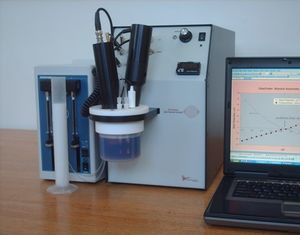Zeta Potential Analyzers
Jump to navigation
Jump to search
Zeta Potential Analyzers is an analytical device for characterizing zeta potential as a property of interfacial layer in liquid particulates (dispersions, emulsions) and porous bodies. There is ISO Standard -13099 being prepared that would describe the main principles underlying functioning of such devices. Zeta potential is not directly measurable parameter. It should be calculated from other experimentally measurable properties of the system using appropriate theory. There is no zeta potential analyzer that would be capable of working with all possible liquid based heterogeneous systems. All of them have limitation. It might be quite challenging to find an optimum device for particular application.
Application Fields
- Environment:Water treatment, waterworks, flocculation agents, dispersants, flocculation control, microorganisms, planktons, asbestos, bubbles, soil, beneficiation technology, and etc.
- Nano-materials:Functional material development,Arecording materials, pigments, ceramics, catalytic agents, polymers, carbon black, carbon nanotubes, inkjet inks, aqueous/non-aqueous solvent paints, fuel cells, coating materials (for automobile parts / electronic parts), paper manufacturing, surface active agents, and etc.
- Life Science:Erythrocyte, biological cells, protein, DDS, liposome, vesicle, drug discovery, and etc.
Features
- Zeta potential measurement
- Microscopic electrophoresis method
- Automatic tracking in image processing
- Visual and manual measurement of individual particles
- Image capture of particles
- Image archive or remeasurement function
- PC-controlled instrument
- Stage control or voltage feedback control or switching control for optical system
